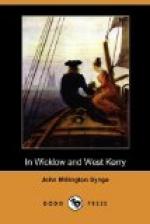‘There is a plant,’ he said, ’which is the richest that is growing out of the ground, and in the old times the women used to be giving it to their children till they’d be growing up seven feet maybe in height. Then the priests and doctors began taking everything to themselves and destroyed the old knowledge, and that is a poor thing; for you know well it was the Holy Mother of God who cured her own Son with plants the like of that, and said after that no mother should be without a plant for ever to cure her child. Then she threw out the seeds of it over the whole world, so that it’s growing every place from that day to this.’
I came out to-day, a holiday, to the Great Blasket Island with a schoolmaster and two young men from the village, who were coming for the afternoon only. The day was admirably clear, with a blue sea and sky, and the voyage in the long canoe—I had not been in one for two or three years—gave me indescribable enjoyment. We passed Dunmore Head, and then stood Out nearly due west towards the Great Blasket itself, the height of the mountains round the bay and the sharpness of the rocks making the place singularly different from the sounds about Aran, where I had last travelled in a curagh. As usual, three men were rowing—the man I have come to stay with, his son, and a tall neighbour, all dressed in blue jerseys, homespun trousers and shirts, and talking in Irish only, though my host could speak good English when he chose to. As we came nearer the island, which seemed to rise like a mountain straight out of the sea, we could make out a crowd of people in their holiday clothes standing or sitting along the brow of the cliff watching our approach, and just beyond them a patch of cottages with roofs of tarred felt. A little later we doubled into a cove among the rocks, where I landed at a boat slip, and then scrambled up a steep zig-zag pathway to the head of the cliff where the people crowded round us and shook hands with the men who had come with me.
This cottage where I am to stay is one of the highest of the group, and as we passed up to it through little paths among the cottages many white, wolfish-looking dogs came out and barked furiously. My host had gone on in front with my bag, and when I reached his threshold he came forward and shook hands with me again, with a finished speech of welcome. His eldest daughter, a young married woman of about twenty, who manages the house, shook hands with me also, and then, without asking if we were hungry, began making us tea in a metal teapot and frying rashers of bacon. She is a small, beautifully-formed woman, with brown hair and eyes—instead of the black hair and blue eyes that are usually found with this type in Ireland—and delicate feet and ankles that are not common in these parts, where the woman’s work is so hard. Her sister, who lives in the house also, is a bonny girl of about eighteen, full of humour and spirits.




